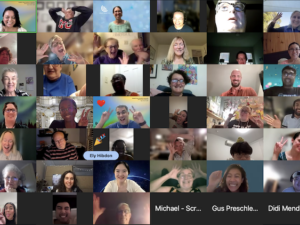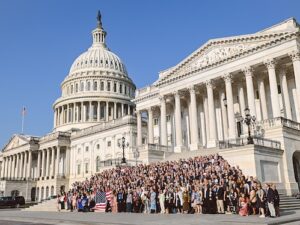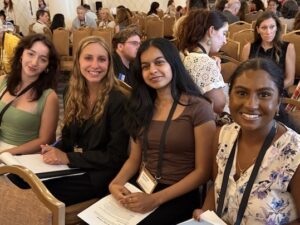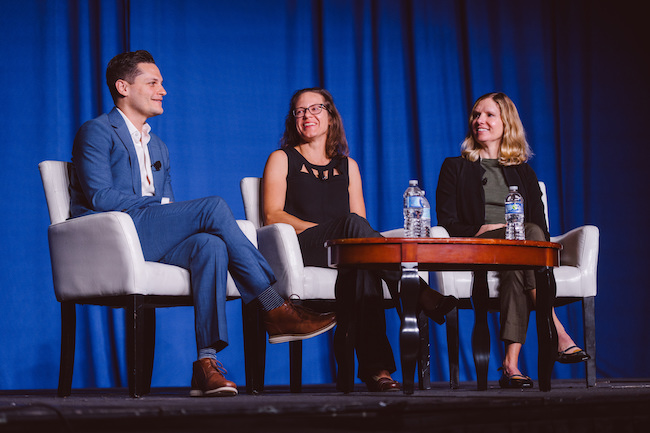
Potential Energy’s Elan Strait, Science Moms’ Dr. Sierra Petersen, and CCL’s Lesley Beatty
Breaking the climate silence: How CCLers held tens of thousands of climate conversations
By Charlotte Ward
In recent months, Citizens’ Climate volunteers across the country have had open and honest conversations with their friends, family, and communities about climate change.
It began during Earth Month when we challenged volunteers to have 25,000 conversations about climate. Of course, CCLers are out talking about climate all the time, but this was the first time we’d put a goal on the number of climate conversations and encouraged folks to bring those conversations into their day-to-day lives.
In true CCL spirit, volunteers got to work across all 50 states, breezing through the 25,000 conversation count during April 2024 and then keeping the momentum going. To date, CCLers have racked up over 42,000 conversations about climate, doing incredible work to break the taboo that climate change talk is too doom-and-gloom or too partisan.
So why are climate conversations so important?
“The majority of Americans are concerned about climate change, but comparatively few of us talk about it,” says Lesley Beatty, CCL’s Vice President of Marketing. “One, it can be a bit of a downer to introduce, and two, it’s potentially a polarized conversation, so it’s no wonder that we avoid talking about it. But that means climate change seems less serious of a problem than it really is. We know that one of the ways people understand something to be important is to hear people around them talking about it.”
And when we do talk about climate change with our friends and family, the more real and relevant it becomes, making it more likely that we can move from just talking to acting.
To make our climate conversations as productive as possible, Citizens’ Climate teamed up with Potential Energy Coalition and Science Moms, two organizations that are working to break the silence on climate. We heard directly from them at our 2024 Summer Conference:
Based on their advice, CCLers have been following a simple 3-step process to make their climate conversations more meaningful since April of this year.
STEP 1: Heart
Connect on a personal level with an opening question: “I care more than anything else about my family, and I’m sure you do too. Is climate on your list of things you worry about when you think about your childrens’ future?”
STEP 2: Head
Bring out concerns and impacts through facts and data: “Wow, it seems too hot for this time of year. I heard the world is heating up to 50 times faster than it has at any other time in history. The weather sure doesn’t seem the way it used to be. What do you think?”
STEP 3: Hands
Talk about solutions and your experience volunteering with CCL: “If we act now, we can protect the planet for future generations. Our elected officials have the keys to solutions, which is why I am urging them to do more. ”
Hundreds of CCLers reported back on conversations that had happened in all kinds of places from church fellowship, to book clubs, city council meetings and doctors appointments as well as shared activities such as hikes. Unsurprisingly, over 60% of CCL conversations were at Earth Day events which gave volunteers a great opportunity to talk about the climate issue.
As they honed their conversations, volunteers weaved CCL’s values of respect and appreciation into their dialogue, working to build rapport first. They asked questions, listened intently and acknowledged where each person was coming from, before bringing the exchange around to climate action.
As one volunteer reported back, “What does not work is suddenly bringing up the topic from apparently out of nowhere, with no introduction or transition.”
Another added, “I usually wait for a good opener like what I do for work, or the weather, or my EV, so it doesn’t seem like I’m trying to sell something.”
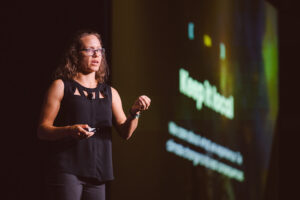
Dr. Sierra Petersen
Talk like a human
“If the conversation feels normal and natural people are more receptive to it,” confirms Science Moms’ Dr. Sierra Petersen, an environmental science professor at the University of Michigan who spoke on this topic at CCL’s 2024 Summer Conference.
“There’s really no need to exaggerate. Just the simple facts are enough to be persuasive. You want to build trust, you don’t want to be seen as having an angle or trying to scare people.”
Say this, not that
As climate-concerned citizens, we’re pretty immersed in this issue. But that means the language we use sometimes doesn’t resonate with people who aren’t as plugged in. Sierra adds that changing our vocabulary can help other people to make their own connection to the urgency.
“Nobody wants to feel stupid. Nobody wants to hear a word and not know what it means,” she cautions. “Instead of saying ‘decarbonization,’ ‘greenhouse gases’ and ‘carbon footprint,’ use words that are more familiar like ‘pollution’ and ‘overheating.’”
Keep it local
It’s also important to tie climate change to the real consequences we face today in our communities and everyday life.
“Local impacts are always going to be more impactful than global ones,” says Potential Energy’s Ernesto Alcantar, a guest speaker on CCL’s national call earlier this year. “People care about people, and what works is often coming to the understanding that people like me are being affected.
“We have to paint the picture of what that looks like to us today. We have to talk about our state, our towns, neighbors, and kids. Think about the things that are at risk within our communities today, for example, local outdoor destinations, our beaches, our parks, our camping spots. Those are all places that we love to escape to, that are at risk if we don’t stop polluting. The great news is that you all are extremely qualified to be messengers to your friends, your loved ones, and your community members.”
Later is too late
To pinpoint the most effective climate communication, Potential Energy did a global study across more than 20 countries to discover the messages that universally resonate with audiences. The singular theme that united people the most was the importance of acting now to protect those we love.
Ernesto adds, “This idea about generational urgency, about protecting our kids and that later is too late to take action. This message was the number one message across every single country that we tested in.”
Lead with feelings
Meanwhile, Science Moms encourage leading with feelings and common ground.
“You’re a parent, you care about your children, we have that in common and let’s think about their future,” adds Sierra, imagining a successful climate conversation with another mom. “Think about what you and that person may have in common and try to start from a position of agreement.
“If someone is not receptive to climate change, find a different angle; we want to bring clean energy jobs to our neighborhood; we should have more clean energy and upgrade our grid for less power outages,” she suggests.
“Perhaps they won’t agree with you that day, but something may be rooted in their brain. People don’t want to say to you, ‘You’re right,’ but you may have planted a seed.”
Avoid doomism
“It can feel like the problem is too big and the solutions are too small but solutions are happening,” says Potential Energy’s Head of Policy, Elan Strait, who presented at CCL’s Summer Conference. “Climate change is human-caused and it can be human-solved.”
“We make a mistake of making it binary, either we solved climate change or we didn’t. That’s not really the challenge. It’s a gradient scale and everything people do really does make a difference.”



